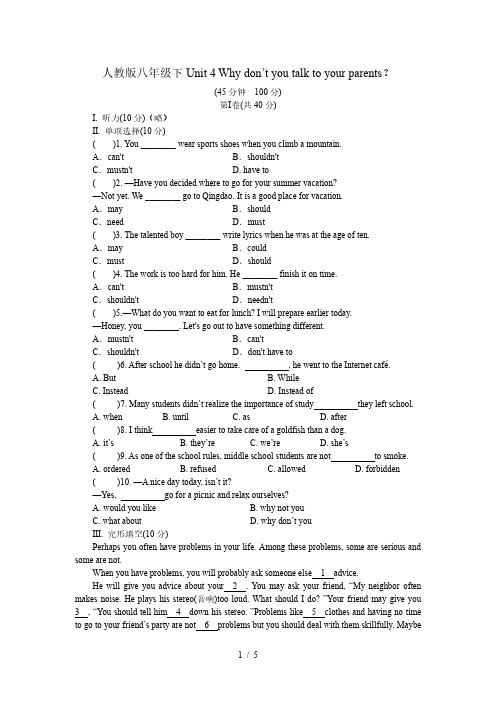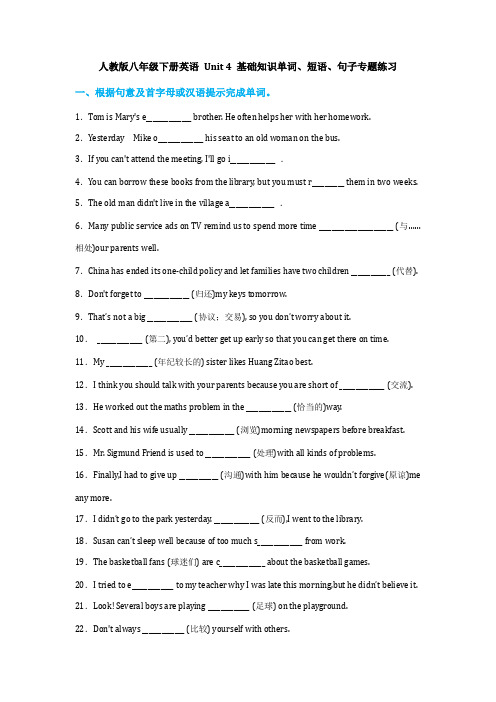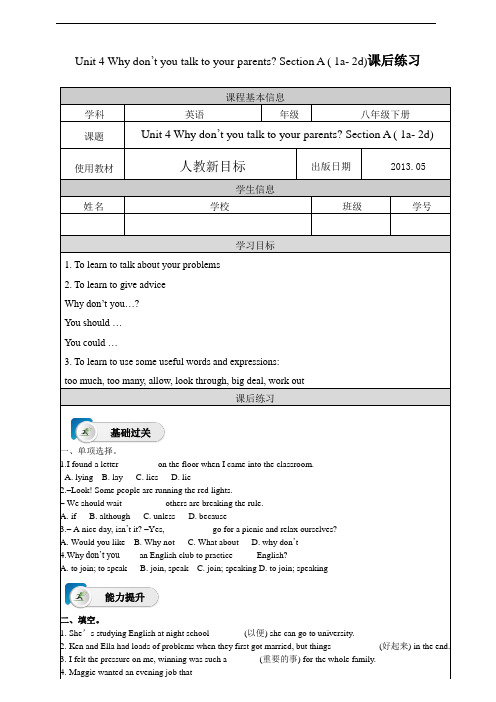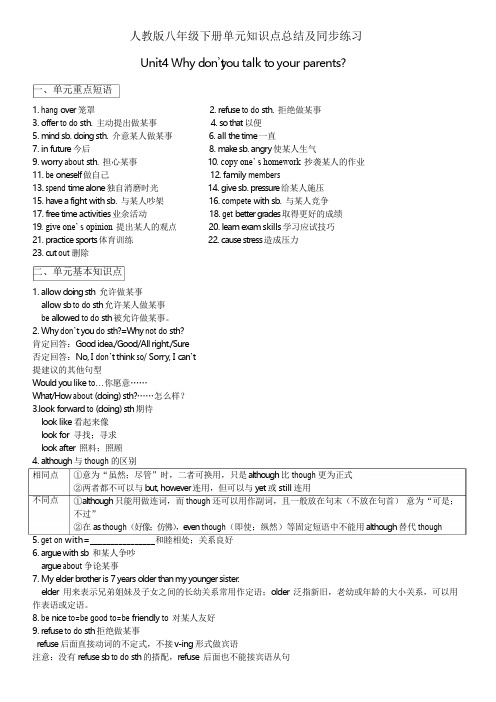人教版英语八年级下unit4讲解与练习
级人教版八年级下册英语_Unit4_第四单元笔记+练习.doc

八年级下册Unit 4He said I was hard-working单元笔记【单元目标】【词汇学习】1.mad adj.极为愤怒的;十分恼火的She was mad with me for losing my keys.她为我丢了钥匙而生我的气。
2.anymore adv.再;还(用于否定句)He doesn't come here anymore.他再也不到这儿来了。
3.however adv.无论如何He can answer the question however hard it is.不管问题有多难他都能回答。
4.suppose v.假定;认为;料想;期望What do you suppose you will do after school? 你放学后想干什么?5.nervous adj.紧张的;神经质的I felt very nervous when I went into his office.当我走进他的办公室时,我感到很紧张。
6.semester n.一学期;半年We will have ten subjects in this semester.这个学期我们将学十门功课。
7.disappointing adj.令人失望的Maybe this news is disappointing .也许这是一个令人失望的消息。
8.be supposed to 认为必须;认为应该You are supposed to be successful.你应该成功。
9.get mad 变疯;变得着迷She gets mad about going to dance.她对跳舞着了迷。
10.get over 恢复,克服困难Can we get over this difficulty? 我们能克服这个困难吗?11. first of all 首先12. pass on 传递13. be supposed to 被期望或被要求……14. do better in 在......方面做得更好15. be in good health 身体健康16. report card 成绩单17. get over克服;恢复;原谅18. open up 打开;开拓;开发;开放19. care for照料;照顾20.have a party for sb.为某人举行一次聚会21.be mad at sb 对某人恼火,愤怒【重点句型分析】1. What are some soap operas you know? 你所知道的有哪些肥皂剧?you know是定语从句,修饰前面的名词soap operas2. What are some things that happen on soap operas?肥皂剧里发生了些什么事?That happen on soap operas 是定语从句,修饰前日面的名字something.拉娜说她不再生玛西娅的气了。
人教版八年级英语下册家庭教师带课知识及练习精编unit 4

将所给直接引语变为间接引语,每空一词:1. “I never eat meat.”he said.He said that ______ never ______ meat.2. The teacher said, “The sun rises in the east and goes down in the west.”The teacher said that the sun ______ in the east and ______ down in the west.3. “He will come here before five.”he said.He said that he ______ go ______ before five.4. “I will buy this house 10 years later.”he said. He said that he _______ buy this house ______ 10 years.5. “Do you have a brother or sister?”he said.He ______ ______ I ________ a brother or sister.6. He said, “You can sit here, Jim.”He ______ Jim that he ______ sit there7. He asked, “How do you find it, mother?”He asked her mother ______ ______ ______ found it.8. “Do you know where she lives?”he asked.He asked ______ ______ knew where she ______.9. “Stop making so much noise, children.”he said. He ______ the children ______ ______ making so much noise.10. “Don’t tell him the news.”she said.She told me _______ ______ ______ him the news. 11. “Are you interested in this?”he said.He ______ ______ I was interested in ______.12.He said, “I am playing basketball with my brother.”He said that he ______ _______ basketball with ______ brother.13. “I am having supper,” he said.He said that _______ _______ having supper.14. “I’ve seen the film,” Gina said to me.Gina _______ me that she _______ _______ the film.15. “I go home with my sister,” she said.She said that _______ _______ home with her sister.16. The teacher said, “The sun is bigger than the moon.”The teacher said that the sun _______ bigger than the moon.17. “Y ou must come here before five,” he said.He said that I _______ to go _______ before five. 18.He said,”Are you good at football?”He ______ ______ I _______ good at football.19.He said,“I am very sorry.”He said that _______ ________very sorry.20.She said to her son, “I'll check your homework tonight.”She said to her son that she ______ check his homework that night. 21.“I am very glad to visit your school”, she said. She said she _______ very glad to visit our school.22.Tom said, “We are listening to the pop music.” Tom said that they _______ ________ to the pop music.23.She said, "He always feels tired."She said he always ______ tired.直接引语变间接引语口诀一、当直接引语为陈述句,变成间接引语的“顺口溜”是:去掉引号加that,人称变化要灵活,时态向后退一步,状语变化按规则。
人教版英语八年级下册(讲义)Unit 4 — Why don`t you talk to your parents .词句精讲精练

人教版英语八年级下册Unit 4 Why don’t you talk to your parents?词句精讲精练词汇精讲1. allowallow作动词,意为“允许”。
用法如下:(1)allow sth.意为“允许某事的发生”。
例如:I can’t allow such a thing. 我不允许发生这样的事。
(2)allow doing sth.意为“允许做某事”。
例如:We don’t allow eating in the classrooms. 我们不允许在教室吃饭。
We don’t allow smoking here. 我们不允许在此抽烟。
(3)allow sb. to do sth.意为“允许某人做某事”。
例如:Her father would not allow her to eat sweets. 她父亲不允许她吃糖果。
They don’t allow students to smoke in the classroom. 他们不允许学生在教室抽烟。
(4)allow sb. sth. 意为“给予某人某物(尤指钱或时间);让某人有(拥用或带有)某物”。
例如:He allows his son too much money. 他给他儿子的钱太多。
We’ll allow you time to answer. 我们将给你回答的时间。
2. get on withget on意为“相处,进展”,也可用get along,其后接介词with。
get on with sb. 意为“与某人和睦相处/关系良好”;get on well/badly with sth. 意为“某事进展顺利/不好”。
例如:He gets on (well) with his classmates.他和同学们相处融洽。
How do you get on with your studies?你的学业进展如何?【拓展】get on 还有“上车”的意思,后面常接bus; train等表示交通工具的词;反义词为get off。
人教版英语八年级下Unit 4 训练题 含解析

人教版八年级下Unit 4 Why don’t you talk to your parents?(45分钟100分)第Ⅰ卷(共40分)Ⅰ. 听力(10分)(略)Ⅱ. 单项选择(10分)( )1. You ________ wear sports shoes when you climb a mountain.A.can't B.shouldn'tC.mustn't D. have to( )2. —Have you decided where to go for your summer vacation?—Not yet. We ________ go to Qingdao. It is a good place for vacation.A.may B.shouldC.need D.must( )3. The talented boy ________ write lyrics when he was at the age of ten.A.may B.couldC.must D.should( )4. The work is too hard for him. He ________ finish it on time.A.can't B.mustn'tC.shouldn't D.needn't( )5.—What do you want to eat for lunch? I will prepare earlier today.—Honey, you ________. Let's go out to have something different.A.mustn't B.can'tC.shouldn't D.don't have to( )6. After school he didn’t go home. , he went to the Internet café.A. ButB. WhileC. InsteadD. Instead of( )7. Many students didn’t realize the importance of study they left school.A. whenB. untilC. asD. after( )8. I think easier to take care of a goldfish than a dog.A. it’sB. they’reC. we’reD. she’s( )9. As one of the school rules, middle school students are not to smoke.A. orderedB. refusedC. allowedD. forbidden( )10. —A nice day today, isn’t it?—Yes, go for a picnic and relax ourselves?A. would you likeB. why not youC. what aboutD. why don’t youⅢ. 完形填空(10分)Perhaps you often have problems in your life. Among these problems, some are serious and some are not.When you have problems, you will probably ask someone else1advice.He will give you advice about your2. You may ask your friend, “My neighbor often makes noise. He plays his stereo(音响)too loud. What should I do? ”Your friend may give you 3, “You should tell him4down his stereo. ”Problems like5clothes and having no time to go to your friend’s party are not6problems but you should deal with them skillfully. Maybeyou should buy some new clothes. You should call your friend to say “Thanks” and7you are sorry for not being able to go there. Problems like a quarrel(吵架)with your friend and not having enough money are serious8. You should talk with him and be9. If you don’t have10, you should go to work or get a part-time job. Anyway you should learn how to deal with your problems.( )1. A. for B. to C. on D. with( )2. A. life B. problems C. questions D. friends( )3. A. a job B. thought C. a piece of advice D. an order( )4. A. turns B. to turn C. to low D. to bring( )5. A. out-of-style B. new C. in style D. good( )6. A. heavy B. small C. new D. serious( )7. A. that B. which C. what D. where( )8. A. problem B. thought C. one D. ones( )9. A. happy B. friendly C. good D. strong( )10. A. clothes B. friends C. money D. jobsⅣ. 阅读理解(10分)Peter wondered why he didn’t have many friends. The reason was that he was always taking, never giving.One day Peter told Bill, “I’d like to give a party on Saturday. I’d like you to come and bring Martha, too. ” “Thanks, Peter. We’d be happy to come. ”“Perhaps you’d like to bring your violin. You and Martha sing well together. I’m sure everyone will want you to sing for us. ”That was how Peter began to plan his party. Next he asked another friend, Betty, to bring a cake. “You make the best cake in the world, Betty, and I like to eat your cake better than have one from the bakery(面包店). ”Peter invited a few other friends to come to his party. He didn’t forget to ask for something from each of them. He even asked Jim Jackson and Mary Jackson to let him give the party at their house! They agreed.The party was a big success. However, as the guests were leaving, they said “Thank you! ”to Bill and Martha for the music, Betty for the cake, the Jacksons for the use of the house and to others for their hard work. To Peter they just said, “Thanks for the invitation. ”( )1. The party was held.A. at Peter’s houseB. in a large hallC. at Peter’s friends’houseD. in a secret place( )2. Which of the following is NOT true?A. Betty made the best cake.B. Mary Jackson sang well.C. Bill sang well.D. The Jacksons did hard work for the party.( )3. liked Peter.A. Many of his friendsB. Few peopleC. EveryoneD. All his friends( )4. Peter to the party.A. tried his bestB. did nothingC. only invited some friendsD. did everything( )5. From the story, we can see Peter was.A. a warm-hearted manB. good at making friendsC. a selfish manD. a welcome friend第Ⅱ卷(共60分)Ⅴ. 词汇运用(10分)(Ⅰ)根据句意及汉语提示完成单词。
人教版八年级下册英语第四单元基础知识单词、短语、句子专题练习

人教版八年级下册英语Unit 4 基础知识单词、短语、句子专题练习一、根据句意及首字母或汉语提示完成单词。
1.Tom is Mary's e______________ brother. He often helps her with her homework. 2.Yesterday Mike o______________ his seat to an old woman on the bus.3.If you can't attend the meeting, I'll go i______________ .4.You can borrow these books from the library, but you must r__________ them in two weeks. 5.The old man didn't live in the village a______________ .6.Many public service ads on TV remind us to spend more time _______________________ (与……相处)our parents well.7.China has ended its one-child policy and let families have two children ____________ (代替). 8.Don't forget to ______________ (归还)my keys tomorrow.9.That’s not a big ______________ (协议;交易), so you don’t worry about it.10.______________ (第二), you’d better get up early so that you can get there on time. 11.My ______________ (年纪较长的) sister likes Huang Zitao best.12.I think you should talk with your parents because you are short of ______________ (交流). 13.He worked out the maths problem in the ______________ (恰当的)way.14.Scott and his wife usually ______________ (浏览)morning newspapers before breakfast. 15.Mr. Sigmund Friend is used to ______________ (处理)with all kinds of problems. 16.Finally,I had to give up ____________ (沟通)with him because he wouldn’t forgive(原谅)me any more.17.I didn’t go to the park yesterday. ______________ (反而),I went to the library.18.Susan can’t sleep well because of too much s______________ from work.19.The basketball fans (球迷们) are c______________ about the basketball games.20.I tried to e_____________ to my teacher why I was late this morning,but he didn’t believe it. 21.Look! Several boys are playing _____________ (足球) on the playground.22.Don't always _____________ (比较) yourself with others.23.We will _____________ (造成) less pollution if we can find ways to reuse or recycle more rubbish.24.I was not good at writing. My English teacher told me some writing _____________ (技巧). 25.It is a _____________ (典型的) problem. You don't need to feel so surprised at it.二、根据句意及括号内所给单词的提示填空。
Unit4知识点讲解课件人教版八年级英语下册

● —Right. 5G willan ever.
● A. download
B. downloads C. to download D. downloading
● 2. Jenny is afraid to travel by plane. She always feels it.
●
●municate ●考点:① v.交流;沟通 ● ② communication n.交流;沟通 ●搭配: ●communicate with sb与某人交流 ●=have a communication with sb
●3.elder
●考点:① adj.年级较长的
●
② old--elder-eldest
B. because
C. or
D. so that
● 4. —How will she deal with the work?
● —She doesn't want to do it by herself. She wants to ask someone else to do it, .
● A. yet
B. instead C. too
D. either
● (一)单项选择
● 5. Lucy drank sleepy.
coffee so she couldn't sleep well last night. Today she feels
● A. too much; much too B. too much; too much
人教版英语八年级下册
Unit 4 Why don’t you talk to your parents? 知识点详解
By Nancy
2024人教新目标八年级下册英语Unit 4Section A 1a-2d课后练习及答案

Unit 4 Why don ’t you talk to your parents? Section A ( 1a- 2d)课后练习课程基本信息学科英语年级八年级下册课题Unit 4 Why don’t you talk to your parents? Section A ( 1a- 2d)使用教材人教新目标出版日期2013.05学生信息姓名学校班级学号学习目标1. To learn to talk about your problems2. To learn to give adviceWhy don’t you…?You should …You could …3. To learn to use some useful words and expressions:too much, too many, allow, look through, big deal, work out课后练习基础过关一、单项选择。
1.I found a letter ________ on the floor when I came into the classroom.A. lyingB. layC. liesD. lie2.–Look! Some people are running the red lights.– We should wait _________ others are breaking the rule.A. ifB. althoughC. unlessD. because3.– A nice day, isn’t it? –Yes, __________ go for a picnic and relax ourselves?A. Would you likeB. Why notC. What aboutD. why don’t4.Why don’t you____ an English club to practice_____ English?A. to join; to speakB. join, speakC. join; speakingD. to join; speaking能力提升二、填空。
2020人教版英语八年级下册单元知识点总结和同步练习 Unit4(无答案)

t 人教版八年级下册单元知识点总结及同步练习Unit4 Why don ’you talk to your parents?一、单元重点短语1. hang over 笼罩2. refuse to do sth. 拒绝做某事3. offer to do sth. 主动提出做某事4. so that 以便5. mind sb. doing sth. 介意某人做某事6. all the time 一直7. in future 今后8. mak e sb. angry 使某人生气 9. worry about sth. 担心某事10. copy one’ s homework 抄袭某人的作业 11. be oneself 做自己12. family members 13. spend time alone 独自消磨时光14. give sb. pressure 给某人施压 15. have a fight with sb. 与某人吵架16. compete with sb. 与某人竞争 17. free time activities 业余活动18. get better grades 取得更好的成绩 19. give one’ s opinion 提出某人的观点20. learn exam skills 学习应试技巧 21. practice sports 体育训练22. cause stress 造成压力23. cut out 删除二、单元基本知识点1. allow doing sth 允许做某事allow sb to do sth 允许某人做某事be allowed to do sth 被允许做某事。
2. Why don ’t you do sth?=Why not do sth?肯定回答:Good idea./Good/All right./Sure否定回答:No, I don ’t think so/ Sorry, I can ’t提建议的其他句型W ould you like to …你愿意……What/How about (doing) sth?……怎么样?3.look forward to (doing) sth 期待look like 看起来像look for 寻找;寻求look after 照料;照顾4. although 与 though 的区别相同点不同点 ①意为“虽然;尽管”时,二者可换用,只是 although 比 though 更为正式 ②两者都不可以与 but, however 连用,但可以与 yet 或 still 连用 ①although 只能用做连词,而 though 还可以用作副词,且一般放在句末(不放在句首) 意为“可是;不过”②在 as though (好像;仿佛),even though (即使;纵然)等固定短语中不能用 although 替代 though5. get on with=________________和睦相处;关系良好6. ar gue with sb 和某人争吵ar gue about 争论某事7. My elder brother is 7 years older than my younger sister .elder 用来表示兄弟姐妹及子女之间的长幼关系常用作定语;older 泛指新旧,老幼或年龄的大小关系,可以用 作表语或定语。
- 1、下载文档前请自行甄别文档内容的完整性,平台不提供额外的编辑、内容补充、找答案等附加服务。
- 2、"仅部分预览"的文档,不可在线预览部分如存在完整性等问题,可反馈申请退款(可完整预览的文档不适用该条件!)。
- 3、如文档侵犯您的权益,请联系客服反馈,我们会尽快为您处理(人工客服工作时间:9:00-18:30)。
Unit 4 Why don’t you talk to your parents1.I have to study too much so I don’t get enough sleep.1) 此处so为连词,意为“因此,所以”,引导结果状语从句。
例:He had a bad cold yesterday so he didn’t go to school.中考链接(2012.广东)Ben was busy taking a training class, _____ we had to wait for him for half an hour.A. soB. ifC. orD. But2) 此处sleep 为不可数名词,意为“睡觉,睡眠”例:Do you ever talk in your sleep【拓展】sleep (slept, slept) 也可作不及物动词,意为“睡觉”$例:She goes to sleep at nine o’clock every night.2.I have too much homework s o I don’t have any free time to do things I like.1)词语辨析Too much:词义____________可修饰_______________举例_______________________________________________Much too:词义____________可修饰_______________举例_______________________________________________Too many:词义____________可修饰_______________举例_______________________________________________2) 此处to do things 为动词不定式作后置定语,修饰名词time.例:Would you like something ___________你想要吃点什么吗3.】4.My parents don’t allow me to hang out with my friends.1) 此处allow作及物动词,意为“允许”Allow sb. to do sth. 允许某人做某事例句:I can’t allow you to talk to Mom like that.【拓展】a. Allow sth. 允许某事b. Allow doing sth. 允许做某事2)此处hang out (hung out) 意为“闲逛,溜达”例:He often hangs out with his friends.4.I’m really tired because I studied until midnight last night.;此处until为介词,意为“直到......为止”,同义词为till.It may last until tomorrow.【拓展】until为连词,意为“直到......为止”,引导时间状语从句。
I will stay with you until your mother comes back.5.Why don’t you go to sleep earlier this evening辨析:go to sleep, go to bed与sleepGo to sleep: “去睡觉,入睡”,强调动作Go to bed: “去睡觉”,表示上床去睡这个动作,与get up相对Slept:“睡觉”,不及物动词,强调睡的全过程,为延续性动词…例:He often goes to bed at nine.He went to sleep early, for he was very tired.She sleeps for just six hours.6.I am not good at writing letters.Be good at意为“擅长,在......(方面)做得好”,后面接名词、代词或动名词。
其同义短语为do well in.He is good at maths. = He does well in maths.辨析:Be good at: “擅长,善于,在......(方面)做得好”,后面接表示事物的动名词、代词或动名词#Be good for: “对......有益(有用)”,后面接表示人或物的名词或代词Be good to : “对......好(和善)”,后面接人或人格化的名词或代词Be g ood with: “与......相处的好”,后面接表示人的名词或代词7.I don’t want to talk about it on the phone.Talk about 意为“谈论”,后面接人或事。
例:He talked about his plan.8.Well, I found my sister looking through my things yesterday.Look through 意为“翻阅,浏览,仔细看”,为“动词+介词”短语,后面接物。
>例:Look through your notes before the exam.9.Although she’s wrong, it’s not a big deal.1)although 作连词,意为“虽然,尽管”,引导让步状语从句。
(2012.江西)_________ the girl is only nine, she takes care of her brother and cooks meals every day.A. IfB. BecauseC. AlthoughD. As2)big deal为习语,用于口语,意为“什么大不了的事,重要的事,要人”。
例:It’s no big deal! I can find another job any time.3)deal名词,意为“协议,交易”例:I would like to make a deal with you.—【拓展】a. Deal作名词,意为“大量”,航用于短语a good/great deal (of sth.)中例:She reads a good/great deal of books.b. Deal作不及物动词,常与介词with连用,意为“处理,应付”How did you deal with the bike10.My problem is that I can’t get on with my family.Get on with sb.意为“和某人和睦相处,和某人关系很好”,同义短语为get along (well)with sb.例:She can’t get on with her sister.【拓展】on with sth.(=get along with sth.)意为“取得进展”例:I am not getting on very fast with this work.¥on (=get along) 意为“进展,进步”,后接副词或用于how引导的疑问句中。
例:Linda is getting on well at school.11.They fight a lot, and I really don’t like it.A lot此处修饰动词fight,意为“很,非常,常常”。
例:She laughed a lot.【拓展】lot可与形容词或副词比较级连用,意为“很,非常”例:I am feeling a lot better today.lot of (或lots of)作形容词,修饰复数名词或不可数名词,意为“许多,大量”。
例:There are a lot of people in the park.&12.I don’t know if I should say anything to them ab out this.If作连词,此处引导宾语从句,意为“是否”,同义词为whether.例:I don’t know it/whether he will come.【拓展】if作连词,还常用来引导条件状语从句,意为“如果,假如”例:We will go to play football if it doesn’t rain tomorrow.13.When they argue, it’s like a big, black cloud hanging over our home.1)argue 此处用作不及物动词,意为“争吵,争论”。
、[例:The boy argued with his mother about his homework.2)此处like作介词,意为“像......一样”。
例:I am going to be a pop star like Micheal Jackson.辨析:like与asLike:“像......一样”,作介词,用于说明相似关系,指两者在形态上或性质上有相似之处As:“作为,看作”,作介词,用于说明同一关系,指身份、资格等。
对比:He works like a worker.He works as a worker.3)此处over作介词,意为“在......上方”#例:The sun is shining over our head.14.Also, my elder brother is not nice to me.Elder形容词,意为“年纪较长的”,是old的一种比较级形式,主要用于表示家庭成员之间的长幼关系。
例: His elder sister is at school.辨析:elder与olderElder: 年纪较长的,只可指人,用来比较年龄长幼,尤指兄弟姐妹的长幼关系,只能作定语Older:年龄较大的,较老的,较旧的,可指人,也可指物,在句中可作定语,也可作表语填空:My ________ sister is three years ________ than I.15.,16.Instead he watches whatever he wants until late at night.1)instead作副词,意为“代替,反而,却”,修饰整个句子作状语。
例:Jack was ill, so I went instead.He never works, instead he plays all day and all night.中考链接(2011.江苏徐州)We have no coffee. Let’s have tea2)whatever作代词,意为“任何事物,无论什么”,引导名词性从句。
